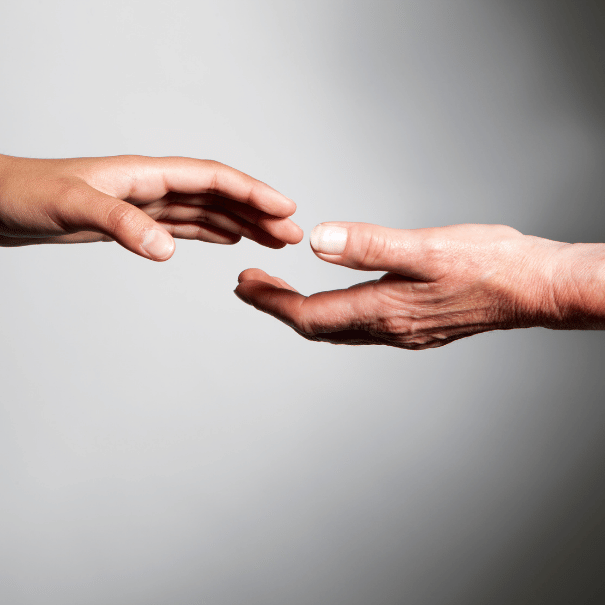

Cultivating Kindness Through Forgiveness and Acceptance: A Path to Lasting Change
Many of us are carrying resentment—whether it’s toward others or ourselves. This resentment, a lingering feeling of unresolved anger or disappointment, can stand in the way of kindness toward ourselves and others, shaping how we see the world, and even how we view ourselves. If we’re aiming for a positive future—not only for ourselves but for our loved ones, our communities, and future generations—this work of forgiveness and acceptance is foundational.
Working with a variety of clients facing everything from addiction and self-doubt to emotional wounds, I’ve seen firsthand the importance of forgiveness and acceptance. It’s a key piece of the puzzle that allows us to move forward, release old hurts, and experience true transformation. And this isn’t about “forgiving and forgetting”; it’s about creating a healthier relationship with ourselves and others, which opens the door to genuine healing.
The Weight of Resentment, Self-Judgment, and Unacknowledged Anger
Walking around with resentment or unprocessed anger is like carrying a heavy backpack. Every grudge, regret, or criticism we hold about ourselves or others adds to that load, subtly impacting our mental and emotional wellbeing. But let’s be clear—anger itself isn’t inherently bad. In fact, we’re only truly angry about things we deeply care about. Anger can be a signal, highlighting something significant about our values, boundaries, or unmet needs.
In my work, I’ve seen the way unresolved anger and self-judgment keep people trapped in old patterns, unable to fully move forward or experience joy. When we suppress or deny our anger, we lose the opportunity to understand what it’s telling us—and to transform that understanding into kindness. The goal isn’t to get rid of “negative” emotions but rather to understand and integrate them. Holding onto resentment without exploring what lies beneath it—whether it’s self-protection, unmet needs, or unresolved pain—can prevent us from moving forward.
Studies have shown that practicing forgiveness and acceptance can improve emotional health and decrease stress. Psychologist Robert Enright, a pioneer in forgiveness research, found that people who practice forgiveness experience lower levels of anxiety and depression, and higher levels of self-esteem (Enright & Fitzgibbons, 2015). In addiction recovery programs like Alcoholics Anonymous, forgiveness and acceptance are core principles of the healing process. These programs recognise that unresolved anger and self-blame can keep people in a cycle of shame, ultimately fueling addictive behaviours (Alcoholics Anonymous World Services, Inc., 2001). While addiction might not affect all of us, the impact of resentment is universal. Whether or not we struggle with addiction, carrying unprocessed anger, guilt, or shame holds us back from fully experiencing life and embracing our true potential.
Common Myths About Forgiveness and Acceptance
Many people have misconceptions about forgiveness and acceptance. Let’s look at a couple that might be holding us back:
– “Forgiving means forgetting”: Forgiveness doesn’t mean erasing what happened. Instead, it’s about no longer allowing it to control us. We can acknowledge hurt while choosing to release its hold on our present.
– “Anger is a negative emotion”: Anger isn’t the enemy. It’s a signal that something matters deeply to us. Instead of avoiding or suppressing anger, we can see it as an invitation to understand what lies beneath—maybe it’s a need for respect, connection, or fairness.
Real forgiveness isn’t about pretending things never happened or rejecting certain emotions. It’s about facing them with compassion and curiosity so that we can move forward.
Why Forgiveness and Acceptance Are Essential for Growth
Forgiveness isn’t about excusing harmful actions or pretending past hurts don’t matter. Instead, it’s about recognising the impact these feelings have on us and choosing to release them for our own wellbeing. Acceptance means acknowledging all parts of ourselves, even the emotions we may have labelled as “negative.” It’s about asking, “What is this anger trying to tell me?”—not suppressing it, but working with it to understand the deeper need or value beneath it.
I’ve witnessed in my clients (and in my own life) how letting go of resentment can be transformational. Holding onto anger—whether it’s toward ourselves for past mistakes or toward others—can halt our healing. But when we allow ourselves to explore the roots of this anger, we often find there’s something deeper there, perhaps a desire for respect, connection, or safety. Accepting these parts of ourselves doesn’t mean we’ll always feel content; it means we allow every part of us to be heard, which is necessary for true integration.
Practical Exercises for Forgiveness and Self-Acceptance
To help bring this into your life, try these practical exercises:
1. Forgiveness Journaling Exercise
– Write about a person or situation that brings up feelings of resentment. Let your thoughts flow without judging or censoring them. Then, ask yourself: What is it that I wanted in that situation that I didn’t get? What would forgiveness look like here, even if I’m not ready to fully let go?
2. Self-Acceptance Letter
– Write a letter to yourself about a time you felt you “fell short.” Then, write back from a place of compassion, as if you were comforting a friend. This practice helps us start integrating self-acceptance by recognising our own humanity.
3. Anger as Insight
– When you feel anger, pause and ask, What is this anger really about? What need or value is at stake here? Understanding the message within your anger can reveal what you need to work through and help guide you toward forgiveness and acceptance.
Reflecting on Your Own Journey
Consider your own life and where you’re at. Ask yourself:
– What grudges am I holding onto, either against myself or others, that might be blocking me from experiencing greater kindness?
– Are there things I tell myself about my past that keep me stuck in guilt or regret?
– What do I find difficult to forgive, either in myself or others?
– When I feel anger, what might it be asking me to look at or understand?
Forgiveness and acceptance may not happen all at once. It’s okay to feel that you’re not ready to let go completely, but just opening up to the possibility and being curious about what holding onto resentment does to you can be a powerful first step. Reflect on how holding onto these feelings might be affecting you—mentally, emotionally, and even physically.
The Path Forward: Opening the Door to Healing
Often, just being willing to look at our pain, resentment, and anger can open the door to healing. Taking this step doesn’t mean forgiving everything right away, but it’s a start. The mere act of acknowledging these feelings without judgment can reveal how they’re holding us back and invite us to find a healthier way forward.
There’s a reason forgiveness and acceptance are part of the 12-step program in AA. These principles help people move beyond shame and self-blame, and they’re essential for true recovery and lasting change. Even if you’re not in recovery from addiction, there’s something universal in this process that we can all learn from: forgiveness and acceptance free us from being defined by past wounds and allow us to make room for all parts of ourselves to be understood and integrated.
Reflective Question for Your Journey
As you think about your own experiences, here’s a question to sit with:
“What might I gain if I opened myself to forgiveness and acceptance—both for myself and others?”
By embracing forgiveness and acceptance, we can begin to create a life that’s not weighed down by past grievances. Instead, we step forward with a clearer heart and mind, ready to experience true connection, peace, and possibility.
References
Alcoholics Anonymous World Services, Inc. (2001). Alcoholics Anonymous (4th ed.).
Enright, R. D., & Fitzgibbons, R. P. (2015). Forgiveness therapy: An empirical guide for resolving anger and restoring hope. American Psychological Association.
PLUS, whenever you’re ready, there are 2 ways we can work together:
- Want to learn to lean into the art of Quiet Influence? Join me at the next intensive.
- Sign up for one of our current courses at ASHC and get taught by my team of advisors and me. All our courses are internationally and nationally industry-approved and will equip you with all the tools to open up your own professional private practice.
- Need help with standing in your power as a woman in leadership? Apply for one of only three spots as my private client.
REFERENCES:
- Catalyst. (2020). Why diversity and inclusion matter: Financial performance. https://www.catalyst.org/research/why-diversity-and-inclusion-matter/
- European Institute for Gender Equality. (2021). Gender equality index 2021: Sweden. https://eige.europa.eu/gender-equality-index/2021/country/SE
- Forbes. (2020). Why women don’t always support other women (And how to fix it). https://www.forbes.com/sites/ellevate/2020/02/10/why-women-dont-always-support-other-women-and-how-to-fix-it
- Harvard Business Review. (2019). Research: Women score higher than men in most leadership skills. https://hbr.org/2019/06/research-women-score-higher-than-men-in-most-leadership-skills
- McKinsey & Company. (2020). Women in the workplace 2020. https://www.mckinsey.com/featured-insights/diversity-and-inclusion/women-in-the-workplace
- Victoria State Government. (n.d.). Gender inequality affects everyone. https://www.vic.gov.au/gender-inequality-affects-everyone
- Workplace Gender Equality Agency. (2022). Australia’s gender equality scorecard. https://www.wgea.gov.au/publications/australias-gender-equality-scorecard


